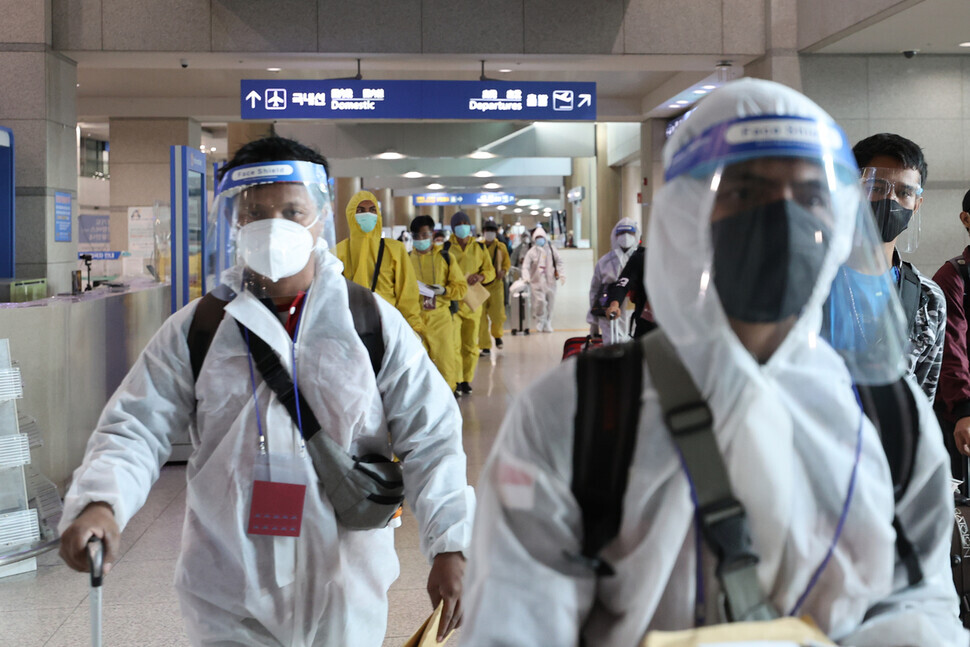hankyoreh
Links to other country sites 다른 나라 사이트 링크
[Editorial] Until vaccine inequity is addressed, none of us is safe

The world is under attack from Omicron, the 13th major variant of the COVID-19 virus and the fifth to be designated as a “variant of concern” by the World Health Organization (WHO). While Korea and other countries have hurried to place travel restrictions on the country where Omicron was discovered and its neighbors, the variant had already spread to 13 countries in five continents as of Monday — not even three weeks since it was first reported on Nov. 11.
The variant’s rapid transmission means it’s probably only a matter of time before it spreads around the entire world. This is a fresh and vivid reminder of the immense difficulty of responding to a global pandemic at the level of individual countries.
Just as with the other viral variants, Omicron first appeared in a low-income country: Botswana, in southern Africa. Low-income countries have less access to COVID-19 vaccines. While high-income countries have reached a full vaccination rate of more than 60% and are already moving on to booster shots, the full vaccination rate in the entirety of Africa has barely reached 7%. The partial vaccination rate – which includes those who’ve only received one vaccine dose — isn’t much higher, at 11%. The WHO and other groups have warned for some time now that these largely unvaccinated low-income countries are breeding grounds for viral variants and will become the epicenter of the global COVID-19 crisis.
In that sense, it’s no exaggeration to say that the Omicron crisis is the result of disregarding vaccine inequity. This crisis is due to major countries’ overemphasis on their economic interests and their selfish hoarding of vaccines in the face of something that not only appeals to our sense of universal togetherness but could also endanger us all — wealthy or otherwise — at any time.
This past September, the top health officials of G20 member countries signed the “Rome Pact” that called for developing countries to receive a fair supply of COVID-19 vaccines. But such declarations of “vaccine equity” are belied by the fact that vaccines supplied through the COVAX Facility, a collective vaccine purchasing project for developing countries, haven’t even reached 70% of its goal.
Global stock markets have been rattled by Omicron, even as the stocks of Pfizer and other vaccine makers have spiked. That’s an example of how untrammeled economic logic can backfire on the economy, as well as how pharmaceutical firms’ monopoly on profit can clash with the interests of the economic ecosystem as a whole.
Intellectuals across the world have called for temporarily suspending patents on COVID-19 vaccines. In July 2020, South Korean President Moon Jae-in and seven other world leaders ran an opinion piece in the Washington Post that began with the message, “None of us is safe until all of us are safe.” The time has come for our leaders to put words into action with bold decision-making.
Please direct questions or comments to [english@hani.co.kr]

Editorial・opinion
![[Editorial] Intensifying US-China rivalry means Seoul must address uncertainty with Beijing sooner than later [Editorial] Intensifying US-China rivalry means Seoul must address uncertainty with Beijing sooner than later](https://flexible.img.hani.co.kr/flexible/normal/500/300/imgdb/original/2024/0517/8117159322045222.jpg) [Editorial] Intensifying US-China rivalry means Seoul must address uncertainty with Beijing sooner than later
[Editorial] Intensifying US-China rivalry means Seoul must address uncertainty with Beijing sooner than later![[Column] When ‘fairness’ means hate and violence [Column] When ‘fairness’ means hate and violence](https://flexible.img.hani.co.kr/flexible/normal/500/300/imgdb/original/2024/0516/7417158465908824.jpg) [Column] When ‘fairness’ means hate and violence
[Column] When ‘fairness’ means hate and violence- [Editorial] Yoon must stop abusing authority to shield himself from investigation
- [Column] US troop withdrawal from Korea could be the Acheson Line all over
- [Column] How to win back readers who’ve turned to YouTube for news
- [Column] Welcome to the president’s pity party
- [Editorial] Korea must respond firmly to Japan’s attempt to usurp Line
- [Editorial] Transfers of prosecutors investigating Korea’s first lady send chilling message
- [Column] Will Seoul’s ties with Moscow really recover on their own?
- [Column] Samsung’s ‘lost decade’ and Lee Jae-yong’s mismatched chopsticks
Most viewed articles
- 1[Editorial] Transfers of prosecutors investigating Korea’s first lady send chilling message
- 2[Column] US troop withdrawal from Korea could be the Acheson Line all over
- 3[Column] When ‘fairness’ means hate and violence
- 4[Editorial] Intensifying US-China rivalry means Seoul must address uncertainty with Beijing sooner t
- 5China calls US tariffs ‘madness,’ warns of full-on trade conflict
- 6‘Shot, stabbed, piled on a truck’: Mystery of missing dead at Gwangju Prison
- 7[Exclusive] Unearthed memo suggests Gwangju Uprising missing may have been cremated
- 8Xi, Putin ‘oppose acts of military intimidation’ against N. Korea by US in joint statement
- 9China, Russia put foot down on US moves in Asia, ratchet up solidarity with N. Korea
- 10Putin’s trip to China comes amid 63% increase in bilateral trade under US-led sanctions